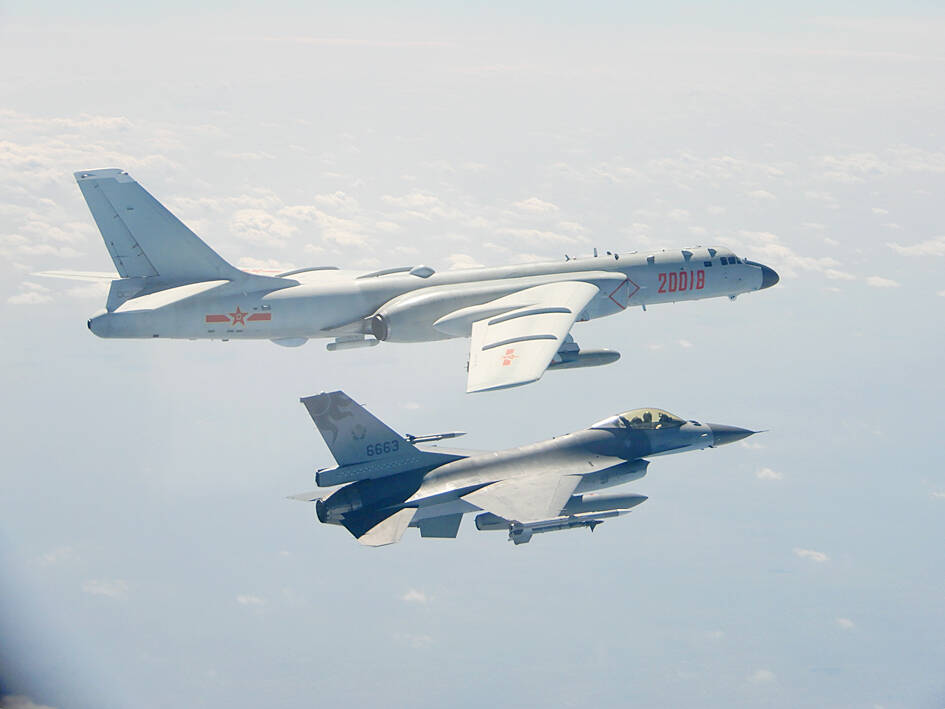Chinese warplane incursions into Taiwan’s air defense identification zone nearly doubled last year, with a surge in fighter jet and bomber sorties as Beijing intensified threats toward the nation.
Relations have been icy for years under Chinese President Xi Jinping (習近平), but last year saw a deeper deterioration, as Xi’s military ramped up incursions and launched the largest war games in decades to protest against a visit by US House of Representatives Speaker Nancy Pelosi in August.
China sent 1,727 planes into Taiwan’s air defense identification zone last year, according to a database based on daily updates released by the Ministry of National Defense.

Photo: EPA-EFE / Ministry of National Defense
That compares with about 960 incursions in 2021 and 380 in 2020.
Fighter jet sorties more than doubled from 538 in 2021 to 1,241 last year, while incursions by bombers, including the nuclear-capable H6, increased from 60 to 101.
Last year also witnessed the first incursions by drones, with all 71 reported by the military coming after Pelosi’s visit.
Military analysts say China has used the incursions to probe Taiwan’s defenses, exhaust its aging air force and voice displeasure over US support for Taipei.
The Chinese “want to show their determination, their will and to coerce the United States: don’t get too close to their red lines, don’t cross their red lines,” former chief of the general staff Admiral Lee Hsi-ming (李喜明) said.
The US recognizes China over Taiwan diplomatically, but remains Taipei’s most important ally.
It opposes any forced change to Taiwan’s status and is bound by the Taiwan Relations Act to supply the nation with the means to defend itself.
Support for Taiwan is a rare issue of bipartisan consensus in Washington and there has been growing alarm over whether China might resort to a military solution, a fear heightened by Russia’s invasion of Ukraine.
Washington has maintained a policy of “strategic ambiguity” toward Taiwan, deliberately making no firm commitment on whether it would come to its defense.
That strategy was aimed at making Beijing think twice about the costs of any invasion, and also to deter Taiwan from formally declaring independence.
US President Joe Biden has been mercurial on the issue of strategic ambiguity.
He has repeatedly said US troops would come to Taiwan’s aid in the event of a Chinese invasion, only for the White House to walk back his comments.
China has used warplane incursions to voice its displeasure about specific events. It sent 71 warplanes to conduct a “strike exercise” on Dec. 25 in response to what it described as “escalating collusion and provocations” by Washington and Taipei.
That came days after Biden signed off on up to US$10 billion in military aid to Taiwan.
August saw a record 440 sorties by Chinese warplanes, the same month Pelosi became the highest-ranking US lawmaker to visit Taiwan in 25 years.

MAKING WAVES: China’s maritime militia could become a nontraditional threat in war, clogging up shipping lanes to prevent US or Japanese intervention, a report said About 1,900 Chinese ships flying flags of convenience and fishing vessels that participated in China’s military exercises around Taiwan last month and in January last year have been listed for monitoring, Coast Guard Administration (CGA) Deputy Director-General Hsieh Ching-chin (謝慶欽) said yesterday. Following amendments to the Commercial Port Act (商港法) and the Law of Ships (船舶法) last month, the CGA can designate possible berthing areas or deny ports of call for vessels suspected of loitering around areas where undersea cables can be accessed, Oceans Affairs Council Minister Kuan Bi-ling (管碧玲) said. The list of suspected ships, originally 300, had risen to about

DAREDEVIL: Honnold said it had always been a dream of his to climb Taipei 101, while a Netflix producer said the skyscraper was ‘a real icon of this country’ US climber Alex Honnold yesterday took on Taiwan’s tallest building, becoming the first person to scale Taipei 101 without a rope, harness or safety net. Hundreds of spectators gathered at the base of the 101-story skyscraper to watch Honnold, 40, embark on his daredevil feat, which was also broadcast live on Netflix. Dressed in a red T-shirt and yellow custom-made climbing shoes, Honnold swiftly moved up the southeast face of the glass and steel building. At one point, he stepped onto a platform midway up to wave down at fans and onlookers who were taking photos. People watching from inside

Japan’s strategic alliance with the US would collapse if Tokyo were to turn away from a conflict in Taiwan, Japanese Prime Minister Sanae Takaichi said yesterday, but distanced herself from previous comments that suggested a possible military response in such an event. Takaichi expressed her latest views on a nationally broadcast TV program late on Monday, where an opposition party leader criticized her for igniting tensions with China with the earlier remarks. Ties between Japan and China have sunk to the worst level in years after Takaichi said in November that a hypothetical Chinese attack on Taiwan could bring about a Japanese

The WHO ignored early COVID-19 warnings from Taiwan, US Deputy Secretary of Health and Human Services Jim O’Neill said on Friday, as part of justification for Washington withdrawing from the global health body. US Secretary of State Marco Rubio on Thursday said that the US was pulling out of the UN agency, as it failed to fulfill its responsibilities during the COVID-19 pandemic. The WHO “ignored early COVID warnings from Taiwan in 2019 by pretending Taiwan did not exist, O’Neill wrote on X on Friday, Taiwan time. “It ignored rigorous science and promoted lockdowns.” The US will “continue international coordination on infectious